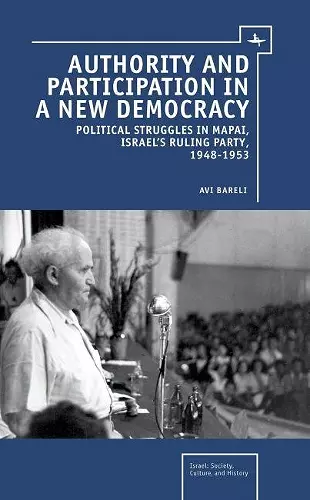Authority and Participation in a New Democracy
Political Struggles in Mapai, Israel's Ruling Party, 1948-1953
Format:Hardback
Publisher:Academic Studies Press
Published:30th May '14
Currently unavailable, and unfortunately no date known when it will be back

Authority and Participation in a New Democracy focuses on the changes undergone by Mapai, Israel’s first ruling party, during Israel’s first years of independence, then analyzes the effects of these changes in relation to Israeli political culture. Bareli’s main claim is that it was only during this period that a hierarchically-organized group of leaders succeeded in imposing its dominance, fostering obedience within the party and creating oligarchic characteristics in Israel’s democracy. The influence of the kibbutz movement, the moshavim movement and of urban intelligentsia— who represented the opposite political view of participatory democracy—was reduced to a minimum. This process would have a profound impact on issues of equality, on the relations between veteran Israelis and immigrants from both European and Islamic countries, and on social and civic norms.
“A seminal study for the understanding of Israel’s formative years. Combining empathy with a sober critical approach, Bareli weaves together historical narrative and social analysis in presenting how the hegemonic Labor Party under David Ben-Gurion laid the foundations for Israel’s democratic system under conditions of war, siege, and mass immigration. Both the achievements and the challenges facing Israel today can be understood only in the context of what was achieved and what was neglected in the early years of the Jewish state.” —Shlomo Avineri, Hebrew University of Jerusalem|“Based on thorough and original research, this book illuminates the process by which Zionist Labour undertook nation- and state -building in the young Israel in of the 1950s. Bareli unfolds a drama of political and ideological struggles that were immanent to such a situation but which inevitably lead to Labour’s eclipse. This is an essential contribution to understanding Israeli current politics.” —Anita Shapira|“The Israeli Labour Party is generally thought to have already been over-centralized and hegemonic in the years preceding the Independence. Avi Bareli offers quite a different picture. In the midst of war, massive immigration, economic hurdles, and acute privations, Mapai adapted and evolved into a modern political ruling party. Its course toward centralization was not due to departure from democratic principles but to the need of meeting the tremendous challenges facing a newly born pluralistic democracy. This thoughtful, meticulous, and illuminating book is one among the best political studies on the Founding era and on the workings of Israeli democracy in the transitional years to full statehood.” —Ran Halévi, Centre de recherches politiques Raymond Aron (Paris)|“The Hebrew version of Bareli’s authoritative study has long been required reading on Israeli political history. Bareli convincingly challenges the conventional images, disseminated by supporters and rivals alike, of an all-powerful Ben-Gurion in the 1950s. Bareli also offers a thorough revision of the historiography of the Israeli labor movement. He questions the ‘Whiggish interpretation’ of the struggle between socialism and etatism that has allegedly shaped its history, and demonstrates that both were essential elements in building the Israeli welfare state. Penetrating the ideological rhetoric, Bareli points to the tension between authority and participation as the major force that has shaped the history of Mapai in the first two decades of statehood: participation was the source of its strength, and authority the cause of its demise.” —Danny Gutwein, University of Haifa
ISBN: 9781936235278
Dimensions: unknown
Weight: unknown
324 pages